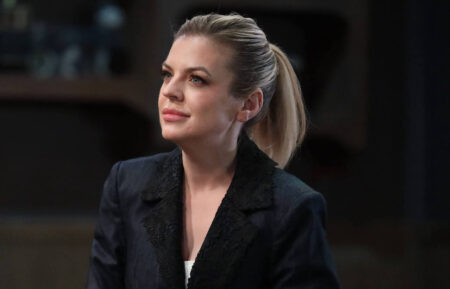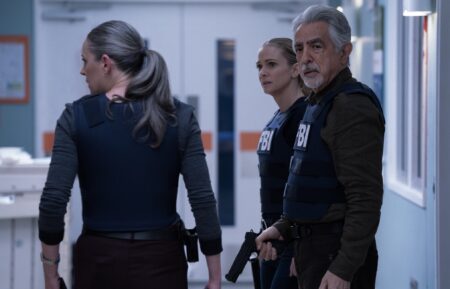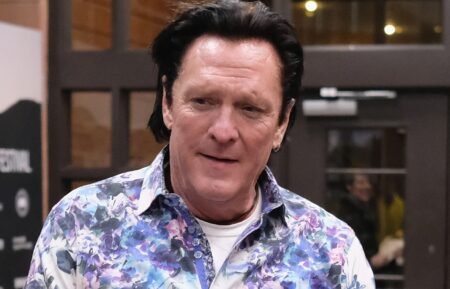Has ‘The Bachelor’ Franchise Traded Fantasy for Emotional Turmoil?

The Bachelorette Season 19 came to a close September 21. It was billed as “the most shocking season finale ever.” But Bachelor Nation has heard that many times before. Each season seems to get more and more dramatic for the cast, with Tuesday’s finale providing a new extreme example. After getting engaged to Tino Franco, Rachel Recchia revealed in After the Final Rose that they broke up not long after filming wrapped.
Tino had kissed another woman while engaged to Rachel, she told host Jesse Palmer. They reunited on After the Final Rose, and the conversation ended up being rather brutal. While Tino was met with (some argue too much) accountability for that moment, Rachel was not held to the same standard. Tino repeatedly tried to explain the context of where their relationship was at when he kissed that woman (whom he had briefly dated before starting Season 19), but Rachel refused to let any of that information be shared.
Many viewers felt the show allowed Tino to be raked across the coals, but wouldn’t let a nuanced conversation about Rachel’s part in their relationship take place. Viewers felt it was a demoralizing experience for Tino that the show should not have allowed. The plot thickened when runner-up Aven Jones showed up at After the Final Rose. With Tino sitting right next to her, Rachel left the stage with Aven, leaving viewers shocked.
“Whatever that was, I hated it,” tweeted former Bachelor Nick Viall. Added franchise alum Ashley Iaconetti: “I’m really, truly, upset by the way that moment was handled. It was cruel. We can support Rachel and not absolutely publicly demoralize someone.”
Unfortunately, angst-ridden cast members seems to be a major recurring theme these days. Clayton Echard was ridiculed in the Season 19 premiere when a choir sang a song called “Clayton Sucks” to Gabby Windey and Rachel, and the Tino drama served as an intense bookend for the season.
This was the most trashy finale of any Bachelor/Bachelorette in franchise history. Rachel’s continued gaslighting, the intentional humiliation of Tino, Aven coming to save the day after Rachel shit on him, and the painful awkwardness of watching Zach meet these women. Garbage.
— ♡ (@grimandtonic) September 21, 2022
How and when did this emotional turmoil become the norm for a franchise that was originally about fairytale romance? Relationship drama, be it happy or sad, is what people come to dating shows for. The intrigue of shows like The Bachelor/ette is the tension these social experiments bring — and the thrill of actually finding love through unique circumstances. But the current format of the show would be unrecognizable to those who haven’t watched since the early years. Now, according to show experts and fans, the franchise makes narratives by putting contestants and leads through an emotional wringer in order to make moments that shock viewers.
TV Insider spoke with She’s All Bach podcast host Stefanie Parker and host of Game of Roses podcast Chad Kultgen about this formula: how they think it formed, why it continues despite a bevy of viewer critique, and more. The consensus from the separate interviews is that the producers are no longer interested in fairytales, a stark contrast for a series whose leads were once “beyond reproach,” according to Kultgen. They both agree this format can be traced back to 2014 with the first “villain” Bachelor, Juan Pablo Galavis.
Like his predecessors, Juan Pablo got favorable edits for most of the season, but the way he treated the women on the show transformed him into a villain, effectively forcing the show’s hand in how he was portrayed.
“I personally believe that moment taught the producers how to edit a lead to make them look bad,” Kultgen says. “Once they had a taste for that in their mouth, it became something that they would start going to again and again, this idea that the lead can do things that go against their structure.”
Since then, Kultgen sees the format as the men are portrayed as undeserving fools (Ben Higgins being the only exception), the women are victims in need of empowerment, and whoever ends up single gets drafted for Bachelor In Paradise.
“In Season 19 of Bachelor, you have Chris Soules, who I would argue is the first ‘fool’ Bachelor. He is promoted as Prince Farming. It’s even a funny name. They haven’t really done that prior to this,” Kultgen continues. “You’ve got ‘The Sexiest Bachelor,’ ‘A Real Millionaire Bachelor,’ things of that nature, and now it’s Prince Farming. They have a whole segment that season that features multiple players in a truck driving through his hometown of Arlington, Iowa, laughing at it. We’ve never seen anything like that.”
Kultgen cites Kaitlyn Bristowe‘s season of The Bachelorette and Arie Luyendyk Jr. and Becca Kufrin‘s unedited breakup (which he says was “one of the hardest things I’ve ever had to watch on television”) as the next prime examples of the format. “All hell broke loose” in Kaitlyn’s season when producers allowed Nick Viall on late.
“We’ve seen people get resurrected before, but never anything like that,” he explains. “She winds up having sex with him outside of the Fantasy Suites. That causes turmoil. And that season becomes, at least in my mind, the first one where, to me, it’s very evident that producers are willing to do things outside the structure of the game in favor of destroying people.”
Kultgen sees a straight-through line from Kaitlyn’s season to Colton Underwood‘s. The moment he jumped the fence was the main narrative for the season’s marketing, and the podcast host thinks producers have been trying to recreate this ever since. It was also Elan Gale‘s final season of The Bachelor, which Kultgen believes established the continuation of chaos.
“I think [the remaining producers] felt they needed to be the one to orchestrate another fence jump,” he says.
Parker says the Colton fence jump was organic, “but that was because they had pushed him and the other contestants to the edge. The emotional manipulation — put an end to that. Figure out how to make real, organic drama instead of pushing people to the edge.”
And as for Clayton, she says, “The episode where we find out that Clayton slept with both women and he has that horrible argument with Susie, that was great television. It got everyone talking about the show and at the end of the day, that’s really all they want.” But notably, Parker says she liked the “Rose Ceremony From Hell” because it happened naturally.
Parker has hosted a slew of franchise alums on She’s All Bach to get behind-the-scenes details. Based on her chats with them, she’s convinced of two things: the cast is apprehensive to trust the show because of negative edits, and the producers seem to think audiences want turmoil over romance.
“Drama brings ratings, and ratings bring money. At the end of the day, they are a business and they are after money. I don’t really understand why they can’t not vilify their leads and still make drama elsewhere,” she explains. “I just had Peter Weber on my podcast, and he recently spoke out and said he dodged a bullet by not going to Paradise this season after seeing how Clayton was depicted on Gabby and Rachel’s premiere. He, as a former lead, doesn’t feel he can trust the producers. It’s kind of difficult at this point, given their track record.”
“I’ve heard from contestants that in order to get tears out of people, they would bring up traumatic things about their past and really stir up emotion,” she adds. “When Jared Haibon left Bachelor In Paradise, he was sad, but he wasn’t really emotional. He said that a producer was telling him on the car ride home about her dog that just died. And her dog really did die. Jared starts talking to her about the dog, and he says something along the lines of, ‘Well, she’s not in pain anymore’ or ‘she’s not suffering anymore. And that’s all that matters.’ And they air it on the show to be that he’s talking about Ashley [Iaconetti], and then it cuts to Ashley crying.”
While it seems that showdowns, scandal, and drama are weapons used to help boost ratings, Kultgen isn’t convinced this is necessarily why viewers tune in.
“We want to see the wish fulfillment. We want the escapism and the fantasy, and that has not been there for a while.”
Some fans are so tired of the show’s choices, they now want to take the reins of casting the leads. Viewers and franchise alums loved the first #BachelorVote during the Season 19 finale. The vote allowed viewers to choose the winner of the first impression rose for the new Bachelor, Zach Shallcross (out of the five eligible women, they chose Brianna Thorbourne). Now they want to use the #BachelorVote to select the show’s lead.
WHY CANT AMERICA VOTE FOR THE NEXT BACHELOR JESSE?! #ATFR #thebachelorette #bachelorette pic.twitter.com/x4NReMc7uC
— Steph R. 🌻 (@stephdizzle11) September 21, 2022
If they’re letting us vote for Zach’s first impression rose they should let us vote for the next Bachelor too.#TheBachelorette
— Bachelor Fantake (@BachelorFantake) September 21, 2022
Kultgen and Parker both agree they want the emotional turmoil to stop.
“From a narrative standpoint, by painting so much of the season, at least that early night one, with this tone of ‘Clayton Echard sucks,’ literally with a song called ‘Clayton Sucks,’ you’re taking away these players’ ability to start to establish their own personalities,” Kultgen says. “You’re also taking away the lead’s ability to establish their own identities outside of being victimized by this guy, like the specter of how much he sucked is hanging over their heads. It made no sense to me.”
His suggestion? Cut the fake drama, return to the romance, make an exclusive streaming service for the franchise, embrace social media/evolve the strategy, and cast Tyler Cameron as the lead. Parker adds to follow the fans’ cries for more diversity, pay the cast more, and should Tyler be interested, “pay him absolutely whatever amount of money he wants.”
Above all else, they want to remind the series that The Bachelor and Bachelorette‘s original formula is still compelling. Keep choosing leads from the previous seasons, point the cameras at them, and let people fall in love.
Bachelor in Paradise, Season 8 Premiere, Tuesday, September 27, 8/7c, ABC












